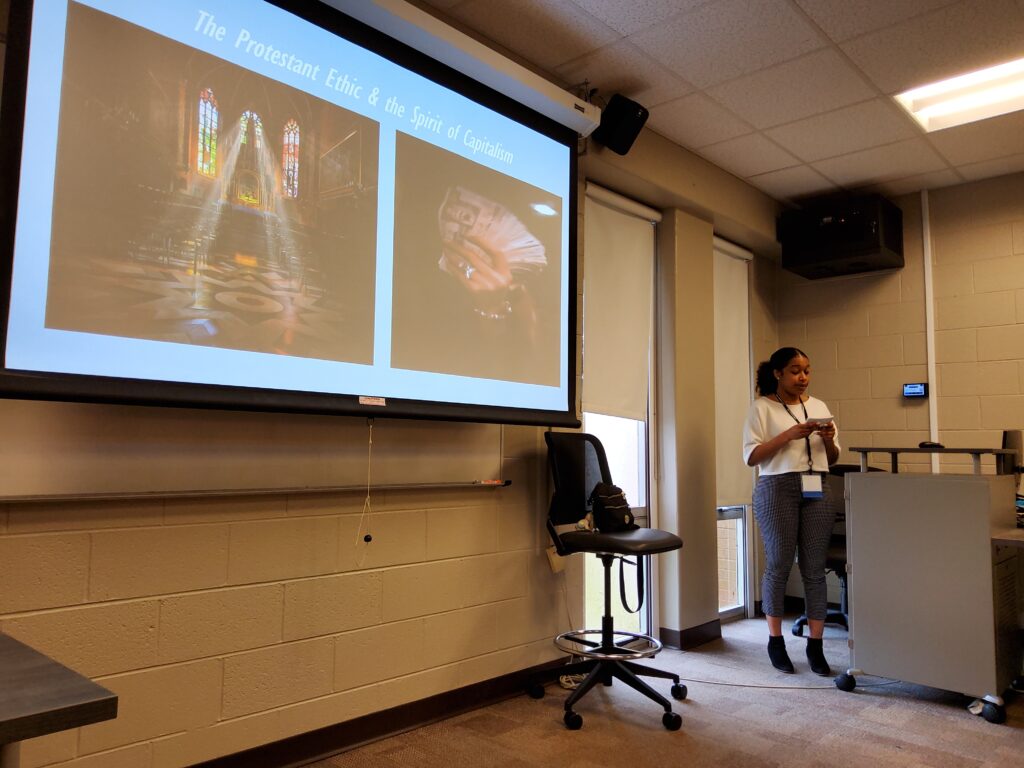The University of West Georgia hosted Scholar’s Day on April 5 for undergraduate students to present their semester research after a two year hiatus.
Senior Sociology major Arial Hutchinson presented “The Perception of Homelessness” at Scholar’s Day panel “Social Barriers and Lived Experiences.”Hutchinson researched how homelessness is portrayed in mainstream media through news, film, social media and how media impacts the representation to actual lived experience of homeless individuals.
“Oftentimes the films that we do have, the ones that people most know would probably be ‘The Pursuit of Happiness’ and ‘The Blind Side,’” says Hutchinson. “Those are really endearing stories concerning two individuals that find themselves homeless and end up with a stroke of luck reaching some kind of success near the end of their story.
“But the problem with stories like that is that they are extremely rare,” continued Hutchinson. “It creates a narrative that if a homeless person works hard enough they can dig themselves out of the hole of homelessness when in reality homelessness is not a personal issue, it’s a social issue which means there are a myriad of social factors that go into a person being homeless.”
During Dr. Tiffany Parsons “Housing and Homelessness” class, Hutchinson found that income and health most often leads to homelessness where some individuals find themselves injured on the job, their parents become ill or find themselves in financial distress.
“[These individuals] just couldn’t cover their bills anymore, and a lot of these were medical care bills,” says Hutchinson. “I think these stories speak to the reality of homelessness in the sense that if you don’t have a familial support system, or a support system in general and you run out of money, it can be extremely hard to maintain having a house.”
These stories usually aren’t the kind shown in film and news outlets usually politicize homelessness.
“Typically, conservative channels look at homelessness as a personal issue and liberal media usually look at homelessness as a social issue, but they also look at homelessness as a problem that will never be fixed,” says Hutchinson.
Karen Rogers gave a presentation titled “Homeless Mental Health and Incarceration” and Gabrielle Williams presented “F.O.S.T.E.R (Family. Over. Systematic. Trauma. Eliminates. Recklessness)”. Each subject presented intersected with Hutchinson’s, holistically portraying how one problem often feeds into another.
“[Williams] was saying many foster children end up homeless,” says Hutchinson. “So I think that goes back to my point that if you don’t have support if you don’t have a family member or friend who can look out for you and even allow you to stay on their couch, it’s very easy to become homeless.”
As Williams stated in her presentation, foster children who age out of the foster care system often end up impoverished, homeless, or incarcerated which only feeds the statistics of Hutchinson’s and Rogers’ research.
“Homelessness is also people who live in their cars, who don’t have permanent housing or people who couch surf,” says Hutchinson. “The rate of college students who are homeless has actually gone up. Especially in California, because tuition is so expensive.”
Hutchison plans to pursue law school after finishing this semester and plans to return as alumnus to present her research at a conference in November.
“Homelessness is a very intricate problem that won’t be solved overnight but research lends a hand in better understanding homelessness.,” says Hutchinson.
You may also like
-
UWG’s Ingram Library Hosts Pop-Up Study Spot to Help Students Prepare for Finals Week
-
UWG Offers Mental Health Support And Academic Services To Maintain Student Success During Finals Week
-
UWG Alumnus Shares His Experience Exploring the Underground Flood Channels of Las Vegas
-
Georgia Students Simulate the Struggles of Dementia
-
UWG PR Students Score a Georgia Power Tour at Atlanta Corporate Office
